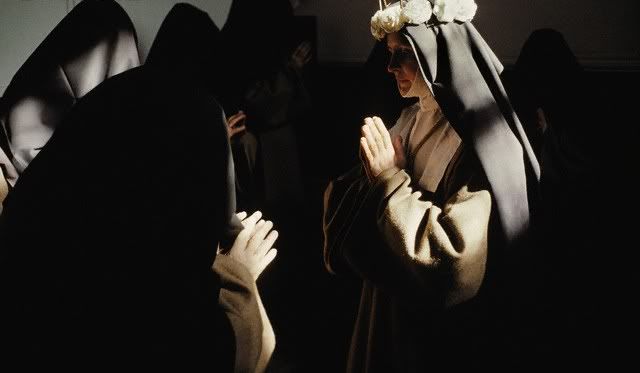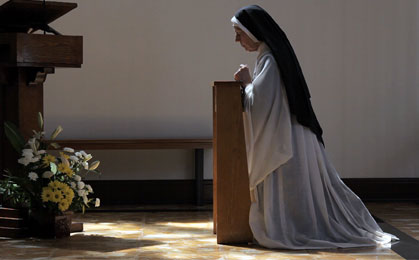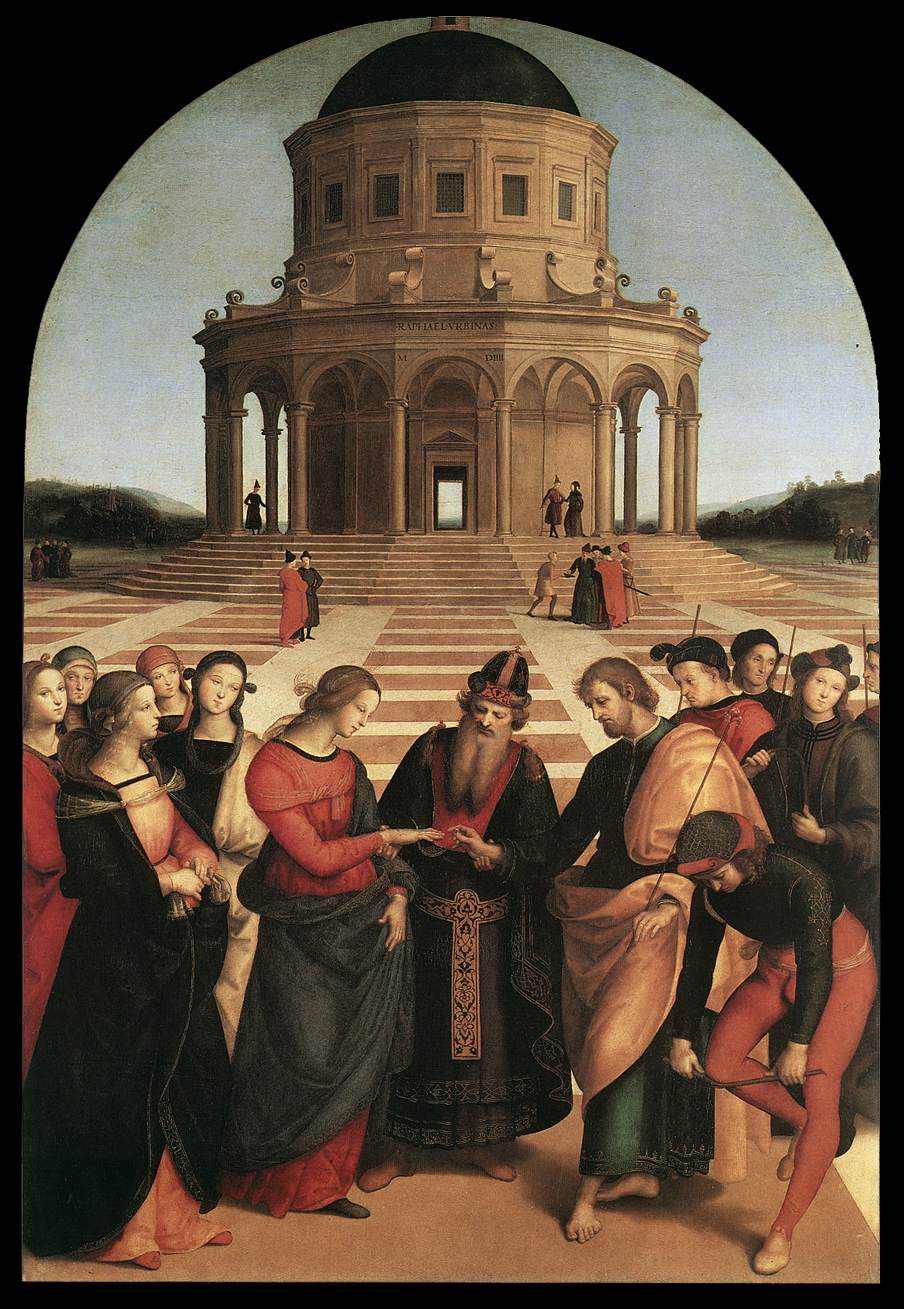Before beginning answering some questions from readers on detachment and humility, I have to say that this McDonald's in Springfield, IL, where I am for three weeks, is the worst Macs I have ever been in, worse than Valletta.
Cold burgers, cold fries, the staff cleans with bleach while people are eating and I am allergic to bleach, and the tables are dirty and full of crumbs.
Eiieueue. So part of my detachment is walking to this hole of a place and blogging for you all. I am smiling as I write this, as God uses every opportunity to teach me detachment.
OK, now to business.
Two people asked me questions about how to be detached regarding family, even one's spouse.
Yes, we are all called to detachment, not merely religious or priests. I shall try to explain better what it is as a necessary virtue for all of us.
Detachment does not mean that we do not love someone, of course, but it means that we love in Christ, for Christ and for the salvation of that person's soul. It means that we love without any expectations.
Love which is based on sentimentality, on the emotions, on manipulation, but on the will. If one is not willing to love through illness, poverty, even certain serious sins of the partner, one is not detached.
Detachment means that one is free to love.
Examples: I can live with the same peace in abject poverty as in luxury, as I am detached from things.
I am not attached sentimentally to anything, although it has been difficult to get to this point.
People who lost everything in Katrina understand this virtue. What is important are not things. Things are there to use, not covet. When one takes pride in things, one is not detached.
This is clear, but what about detachment in relationships?
Detachment brings about the highest form of love, love for the sake of the other person and not for one's own comfort or needs.
Most families have become idols for those in America, who put family above religion, above, even, the Ten Commandments.
I know a man who fell away from the Church because all the rest of his family met for breakfast every Sunday morning for the entire time Masses were offered. He refused to say no to their unrealistic desires. He would not, then, say no to other unrealistic demands and let himself be manipulated by his siblings. He has not gone back to Catholicism and is getting closer to death.
Another couple who were brought to my attention for prayer a while ago use contraceptives, no allowing God to bring life into their marriage. They are both Catholics, but have put their own comfort and supposed needs before the law of God.
These three people lack detachment, the ability to love family in Christ, putting Christ first, and not their own desires.
In marriage, one must move from romantic love to real sacrificial love. God gives most of us opportunities to do this. One must move to complete unselfishness, without any expectations of return. One must love in the will.
True love from God is in the will, not in feelings or attachments. Those of us who have experienced this true love know that it is possible with God's grace to love freely, peacefully, happily in holy indifference.
Indifference does not mean one does not care. Holy indifference means that one can let go of the past, and the future and live wholly in the present moment.
Is it hard to understand Christ's answer to Mary at the Wedding Feast of Cana? He called her Woman as she represented not merely His Mother, but the Woman who brought the Savior of mankind into the world. If Mary did not have holy detachment, she would not have been able to let Christ go into the world, not seeing Him, knowing that He would suffer. She started His three years of ministry. This event of the changing of the water into wine marked the sign of Mary's complete detachment from Her Son.
She loves Him, more than any human being can love Christ, but she is willing at this point in the Gospel to give Him to the world.
God called Joseph to die before Christ' public work began--and this was a necessity to protect both Mary and Christ from misunderstandings regarding His real Father, God. Joseph had to accept going to Hades and waiting for the Harrowing of Hell, which was accomplished after Christ's Death on the Cross.
Joseph had to be detached in his relationship with Mary, not having normal married relations, which God had called him to give up in choosing him to be Mary's protector. We call this a "Josephite Marriage" and one can read other posts on this.
If a married couple really has trouble understanding this, I suggest they go through the Thirty Day Spiritual Exercises from St. Ignatius. I did this a long time ago and this retreat helped me understand and then try to appropriate detachment.
As to our children. we must not see them ever as created in our own image and likeness, but in the image and likeness of God.
I believe totally that one reason for the lack of vocations is an over-possesiveness of parents who do not want to lose contact with their children. Selfish parents can stand in the way of a true vocation.
I know that giving one's son or daughter to God is a real sacrifice for some. Look at my own life. My son does not and never has belonged to me. I was loaned him for awhile to try and form his in God's image and likeness, not mine. At the right time, God called him from the house and I am fare ortunate if I see him once every sixteen months or more. Such is the sacrifice we must all make for our children.
Detachment is not just a call for nuns, sisters, priests, monks. It is a call for all of us. One cannot love in true charity, in true Christlike love without putting to death attachments to the physical as well as the spiritual life.
Here is St. Ignatius himself on detachment:
In everyday life, then, we must hold ourselves in balance before all created gifts insofar as we have a choice and are not bound by some responsibility. We should not fix our desires on health or sickness, wealth or poverty, success or failure, a long life or a short one. For everything has the potential of calling forth in us a more loving response to our life forever with God.
Our only desire and our one choice should be this: I want and I choose what better leads to God’s deepening life in me.
Basically, I have a rule about things, and then I shall comment more on a rule about relationships.
First of all, if a thing does not lead me directly to God, I do not want it or need it. I use what brings life, not death, to the soul.
My new little mobile chapel is not for me, but for the coming future, for those who will not have churches in their areas when the times come when priests become scarce. I do not need this chapel and am very detached from all the things. I can pray just as well in an empty room, but the chapel is not for me.
I have packed away most things given and have now a bare minimum in the room. Simplicity is best, and less is more.
If I have clothes which I have not used in one year, I give them away. I only have things in storage by an accident of history, as the person who was supposed to facilitate the sending of those things to Europe did not do so, after I was already there.
When I can find someone to help me go through the things, most, if not all, will be given away. I have not been able to get help. I have to even be detached from this fact.
Second point, one must be detached from one's own self. I am sharing something personal to underscore this point. Daily, I am in excruciating pain in my lower back, side and even upper back. Some days I cannot even hardly dress myself. I have problems picking these up off the floor and sometimes I cannot eat for the pain.
But, my body does not belong to me. It belongs to God. And, God has has allowed this pain. I accept this in complete detachment, not able to get the help I need for avoiding this. I accept this situation in complete detachment. When I was in Europe and able to walk daily for miles and lived in places without steps, I did not experience this. But, now, God is allowing this for His Glory, not mine. Detachment for wanting to do things, wanting to be strong and whole allows me to be peaceful.
Third, detachment from family members means this. That one love God first, with one's whole heart, whole soul, whole mind, whole will. One can decide to become detached, but one must also beg God for the grace.
Be prepared, for when one asks for the grace of detachment, God takes one seriously and begins to take away things, people, places.
People, including family members, are gifts in our lives, not possessions. The primary love a husband should have for his wife is that of a brother in Christ. He must ask himself the question, "Do my actions bring my wife and children closer to heaven or not? The same is true of the wife. She must order her day so that she is bringing her husband and children closer to God.
When I was raising my son, his salvation was daily in my mind. I did not want to be in the position of the woman who was severely corrected by St. Padre Pio. Remember, he refused to hear the confession of this woman who had not really repented of her sins in her heart. He said to her and I paraphrase, "I refuse to hear your confession. Your son is in hell because of you."
Detachment prevents this type of sin and selfishness.
Garrigou-Lagrange stresses that we are all called to this type of holiness. The religious life makes it easier in one sense, but not in others. Most lay people would not want the daily disciplined order which is demanded in the religious life.
Fourth point and last for today. Detachment is only possible when one loves God first. Once a person has made God the center of one's life can one experience true holy indifference. One of the holiest lay person I know is a man who is completely detachment from his own needs and concentrates on the real physical and spiritual needs of his wife and children. He has a servant heart. He inspires me.
Pray this prayer from St. Ignatius, and you will find detachment. Feel free to ask questions in the com-box.
Take Lord, and receive all my liberty, my memory, my understanding, and my entire will, all that I have and possess. Thou hast given all to me. To Thee, O lord, I return it. All is Thine, dispose of it wholly according to Thy will. Give me Thy love and thy grace, for this is sufficient for me.
God has asked me to give up family, friends, even my beloved country and continent of Europe. He has asked me to give up health, even the normal comforts most people have in life, such as their own room, their own bed, (I sleep on a floor), and other mod cons. At this point, I only ask for His love and His grace. All I have it God's, including STS. This does not mean that I do not love him, but that I love God and God's plan for him more. I love God and His plan for me more than my own life.
I suppose being in Illinois for the next three weeks is part of this. I was sharing yesterday with two people that I lived in England for a very long time, and the man said, "What punishment is this, what did you do to deserve being stuck here in Illinois?"
Punishment, indeed, but I laughed. I am detached. Is there suffering with detachment? You betcha, but the more one practices this, the more joy comes to surround one. Do you not think that this virtue will be absolutely necessary in the tribulation to come?
In a direct answer to one person in the com-box, what happens when the other person in the marriage can no longer support you in any way? One still loves, in detachment.

















